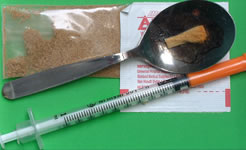A recent report alerting to the appearance of commercial quantities Afghan brown heroin in the far-away (from source) location of Adelaide, Australia, may indirectly assist American militarists and politicians understand why it is that NATO is reluctant to support the U.S. in further calamitous misadventures in the Middle East, Central Asia or anywhere else. It seems the world is no longer enamoured with the violent, brutish, simplistic, naive and INCOMPETENT leadership of the USA – Robert Gates, take note!

Afghan poppy field
The UN office of drugs and crime has released figures indicating that Afghanistan is now the world’s largest supplier of opiates – a fact known for some time in other (organised crime) circles. Furthermore, the UN report states the opiate trade will continue to grow at an “alarming rate!” For analysts and other specialists these figures are no surprise as the Afghan reality mirrors the Vietnam experience; we refer all researchers to Alfred McCoy’s excellent book, ‘The Politics of Heroin in South East Asia,’ in which he outlines the model – in use today – by the CIA and American military in opium growing regions.
Numerous detailed analyses exist, however, none are able to escape the fact that amoral America, willingly and fully conscious of the costs, enters into arrangements with drug warlords in order to expedite its short-term military ambitions!
Too often the servile mass media fraternity lacks the will or courage to follow a story to its logical conclusion – in this instance that story is how American self-interest is affecting the lives of millions of families in Europe and now Australia via the illegal drug trade.
Europe is presently experiencing an explosion in heroin usage as a result of U.S. pacts with Afghan warlords regarding the destination of tons of opiates produced in the region. The largest percentage of heroin destined for Europe enters the continent via Albanian criminal syndicates, especially the notorious Kosovo Liberation 'Army' -- now a close ally of the United States!
America is pursuing its ambitions at EVERYONE'S expense; the U.S. does not hesitate to break any law or convention in its manic pursuits, as has been clearly evident since ‘Bush’ took office.
However, it would seem the world is no longer willing to pay the price for the ambitions of one belligerent nation! America is slowly learning that it must enter into civilised relations with the rest of the world or face becoming the enemy of ALL.
As a consequence of supporting American ambitions Western Europe and now Australia are paying with the lives of their children via the drug epidemic facilitated by the USA!
It is a strange irony that western indifference to the deaths of others in far-away nations now manifests as casualties very close to home.
See:
http://www.radioaustralia.net.au/connectasia/stories/s2157724.htm

Heroin and syringe
http://www.bloomberg.com/apps/news?pid=20601085&sid=a_W5Knv2UWRo&refer=europe

by Patrick Wintour via reed 2008-02-09 08:16:40
Afghanistan's opium economy will take up to 20 years to eradicate and require a £1bn investment from world leaders, according to a government study published yesterday.
The 102-page report was welcomed by the international development secretary, Douglas Alexander, even though it contains some highly critical messages about the effectiveness of some of the aid programmes.
Compiled by the Department of International Development and the World Bank, the analysis suggests at least an extra £1bn needs to be invested in irrigation, roads, alternative crops and rural development to attract farmers away from the lucrative and growing opium industry.
Its conclusions came as the UN produced fresh figures on the opium trade. The UN's Office on Drugs and Crime (UNODC) believes this year's crop will be similar to, or slightly lower than, last year's record harvest.
In 2007 Afghanistan had more land growing drugs than Colombia, Bolivia and Peru combined.
"While it is encouraging that the dramatic increases of the past few years seem to be levelling off, the total amount of opium being harvested remains shockingly high," said UNODC chief, Antonio Maria Costa, in a statement.
"Europe and other major heroin markets should brace themselves for the health and security consequences," he said.
"Much is already happening and very large investments are being made," the report says.
"But these have been fragmented and not within a programatic approach and not with a counter narcotic lens. To achieve results will require consistent approaches, considerable time, persistence in the face of short term setbacks and massive co-ordinated sustained investment, as well as political vision and stamina."
Highlighting the lack of coordination in the current aid effort, the report warns: "The result of weak Afghan leadership and poor donor adherence ... will be some very messy and ill co-ordinated development activities.
"In rural livelihood programmes for example some donors have agreed to consultations, but nevertheless finance programmes outside the budget with scant reference either to the government or agencies."
It says less than a quarter of the total aid to Afghanistan currently goes through the Afghan national budget, and also criticises the military forces in Afghanistan for not sourcing goods and products from within Afghanistan.
"The economic growth needed to displace the opium economy and the development of the necessary infrastructure and governance to support it will take at least one or two decades".
Providing security is an essential component of the counter narcotics effort, but the study says the provincial reconstruction teams set up by Nato forces "by and large have not been successful in ensuring a safer environment for development programmes".
The teams should provide a credible bridge between security activities and their development agenda, and a conducive environment in which the latter can be pursued.
However, the study warns: "It is not clear the PRTs [provincial reconstruction teams] have been able to provide this safe environment for development programmes.
"Moreover foreign military personnel rotate fast which reduces the consistency of policies in PRTs and leads to a disconcerting tendency to 'always try something new'."
It adds that "once a vicious circle sets in development options greatly shrink. Security has deteriorated since 2005. This has two big effects. First donor contributions get eroded as more is spent on security and less on delivery, and second there is a slow down in project delivery."
It argues that in Helmand, the province in which British troops operate and the citadel of opium production, the Taliban insurgency severely limits people's movements making marketing of legal agricultural produce more difficult and dangerous.
In areas of insecurity "opium markets work well. Opium traders provide advances, travel to the farm gate to purchase the crop and cover the cost of transport and bribes to those manning the check posts. They also take the physical risk of travel in secure areas."
The report says: "This creates a near impossible policy challenge trying to establish governance and sustainable development in conditions where there is a fight against insurgents and a political necessity to 'do something' about poppy."
In Helmand once security increases, the report suggest the province could become the home of cotton production. Other new products are raisins, melons, cumin as well as livestock farming.
The report recommends investments of $550m (£275m) to boost rural enterprise development, and $400m for rural road planning, construction and maintenance.
Overall, Afghan farmers need start-up assistance, matching investment grants, cost sharing market development and a commitment to deliver through community development councils with the aid itself seen as coming from the Afghan government, and not the true donor.
The number of poppy-free provinces is expected to rise from 12 in 2007, to 14 or 15, mostly in the north and east, out of a total of 34 Afghan provinces, the UNODC said.
But opium production continues to grow "at an alarming rate" in the south and west, it said. All the poppy farmers surveyed in southern Afghanistan said they paid a tax of 10% of their opium income to the Taliban or corrupt government officials.
© Guardian News and Media Limited 2008
http://www.guardian.co.uk/afghanistan/story/0,,2253074,00.html